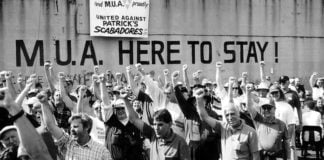The threat of the disaster escalating at Japan’s Fukushima nuclear power complex appeared to be passing as Solidarity went to press. But a fortnight of explosions and releases of radioactive gas have already seen the contamination of wide areas.
The International Atomic Energy Agency has detected high levels of radioactivity between 20 and 50 kilometres from the plants. Evacuations have made 200,000 homeless—and for many it may never be safe to return.
Spinach and milk produced in the area have recorded radioactivity 27 and 17 times the legal limit. It is a tragic reminder of everything that’s wrong with nuclear power.
The disaster followed an 8.9 magnitude earthquake and a massive tsunami which left an estimated 20,000 dead. The earthquake caused the energy grid to fail, and without power, cooling systems for the Fukushima nuclear plants shut down. Unless cooled, immense heat from nuclear fuel rods can melt through the reactor containment core and release lethal radiation.
Three of six nuclear plants at Fukushima appear to have experienced a partial meltdown, in the worst nuclear accident since Chernobyl in 1986. The disaster is worse than Three Mile Island in 1979, the most serious nuclear accident in US history.
Japanese officials have imposed an exclusion zone of 20 kilometres around the plants, while US officials recommended 80 kilometres. Iodine pills have been widely distributed in an attempt to prevent thyroid cancer.
The attempt to stop a complete meltdown has been desperate. The seawater pumped into the reactors to help cool them heats up, forming radioactive steam. This needs to be vented or it can cause explosions, several of which have already taken place. The best-case scenario is that the reactor sites are cooled down and then sealed with concrete. Whatever happens radiation levels will remain dangerously high for years.
Nuclear power isn’t just a risk during natural disasters. Japan’s nuclear industry has a history of mismanagement and fatal disasters. In 2002 the company that owns the reactors, TEPCO, was involved in 29 cases of false reporting of cracks in reactor components. The Monju reactor has been shut down since 1995 due to a sodium leak. In 2004, five workers were killed by a pipe explosion at Mihama-3 station. Despite the dangers, Australian mining companies continue to export uranium to TEPCO.
Nuclear and climate change
In recent years there has been talk of a “renaissance” for nuclear power, justified by claims it is a green, low emissions alternative to fossil fuels. But when carbon emissions from uranium mining, processing and transport are included nuclear is not low emissions. And the problem of storing nuclear waste has never been solved. The government should be expanding renewable energy instead.
While nuclear power in Australia is unlikely, Federal Energy Minister Martin Ferguson’s support for nuclear energy helps justify the expansion of uranium mining. Australia has the world’s largest uranium reserves, 23 per cent of the world’s total.
In November the government signed a deal to allow direct sales of uranium to Russia for the first time. There is also currently an effort to push a nuclear waste dump on Muckaty in the Northern Territory.
Internationally there are 436 reactors operating and 150 in construction. But Fukushima has caused political leaders to re-evaluate nuclear energy. In Germany Angela Merkel has announced the temporary closure of seven reactors. Here plans by supporters of nuclear power to overturn opposition to it at Labor’s national conference this year are finished, with pro-nuclear union leader Paul Howes admitting “the debate is dead”. But unless there is sustained pressure these gestures will be short-lived. The disaster at Fukushima, the international history of nuclear accidents and the potential for nuclear catastrophe, shows exactly why nuclear power is not the answer to our energy needs.
Eliot Hoving





